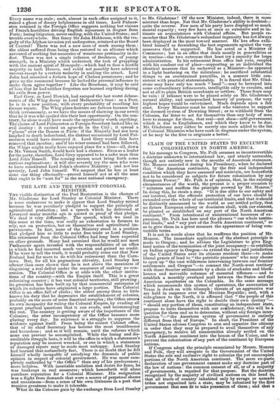THE LATE AND THE PRESENT COLONIAL MINISTER.
THE visible distinction of the Peel Restoration is the change of Mr. Gladstone for Lord Stanley as Colonial Minister. There 'is some endeavour to make it appear that Lord Stanley retired because he was peculiarly pledged to support the principle of agricultural protection ; and a speech which he delivered at Liverpool many months ago is quoted in proof of that pledge. We read it very differently. The speech, which we used in this sense at the time, was really an exhortation to farmers to rely, not on protection, but on themselves and agricultural im- provements. In fact, none of the Ministry stood in a position that pledged him so little to resist free trade as Lord Stanley. His retirement from the Colonial Office had long been expected on other grounds. Many had surmised that he would not meet Parliament again invested with the responsibilities of an office in which he had incurred much vexation and gained no credit. If he were to tell the truth, it would probably come out that New Zealand had far more to do with his retirement than the Corn- laws. But, for all his pugnacious chivalry, Lord Stanley has oftener than once shown that he is not above the meanness of -disguising a real defeat under the assurance of making no con- cession. The Colonial Office is at odds with the other institu- tions of the country—with the Empire itself. This is a great colonizing country ; it has vast colomal territories, still growing ; its greatness has been built up by that commercial enterprise of which its colonies have originated a larea'e portion. The Colonial Office is an office full of clerks ; the ablest among them so little knows his duty that he deprecates the establishment of colonies, probably on the score of some fanatical scruples ; the Office attests its own incapacity for ruling the Colonial Empire, by evading all urgent practical questions that it can evade, and mismanaging the rest. The country is getting aware of the importance of the Colonies; the utter incompetency of the Office becomes more glaring every day. Its existence is a struggle to suppress the evidence against itself. From being the easiest Cabinet office, that of its chief Secretary has become the most troublesome and hazardous ; and so it will remain, until the reforms which -none can prevent be accomplished. While the losing and dis- creditable struggle lasts, it will be the office in which a statesman's reputation may be soonest wrecked, or one in which a statesman of damaged repute may be made most unhappy. Lord Stanley had learned that melancholy fact. There is no doubt that he felt himself wholly incapable of satisfying the demands of public opinion in respect of colonial government. He was more com- pletely enthralled by "the Office" than any of his predecessors ; more helpless. With insatiable ambition and desire for fame, he was bankrupt in real measures ; which henceforth will alone purchase reputation for a Colonial Minister. His resignation was a flight from demands that were a source of perpetual shame and uneasiness—from a sense of his own littleness in a post that recirres greatness to make it tolerable.
What do the Colonies gain by the exchange from Lord Stanley
to Mr. Gladstone? Of the new Minister, indeed, there is more mistrust than hope. Not that Mr. Gladstone's ability is doubted—. quite the reverse. Few men of his party have displayed so much mental capacity ; very few have at once so extensive and so in- timate an acquaintance with Colonial affairs. But people re- member that Mr. Gladstone's redundant ingenuity has not always been displayed in the most toward manner. He 1289 often exhi- bited himself as furnishing the best arguments against the very measures that he supported. He has acted as a Minister of Commerce ; but in an office that deals mostly in generalities or in routine—the two extremes that least try a capacity for large administration. In his retirement from office last year, coupled with his conduct out of place—supporting as an individual the identical measure that he eschewed as a Minister—he appeared in a light bordering on the ridiculous : he sacrificed substantial things to an overstrained punctilio, in a manner little con- sistent with practical statesmanship. It is feared that Mr. Glad- stone may have only too much "head "—may be betrayed into some extraordinary refinements, intelligible only to casuists, and not at all to plain British merchants or settlers. These fears may be vain : if reliance were to be placed solely on Mr. Gladstone's natural ability, and unimpeached honesty of purpose, the very highest hopes would be entertained. Much depends upon a fair start. Every Minister must be ruined who ventures to support the doomed system of Downing Street ; or to withhold from the Colonies, far fitter to act for themselves than any body of men here to manage for them, that real—not sham—self-government which is due to Englishmen, and which they know to be due. Mr. Gladstone may either be merely one more added to the list of Colonial Ministers who have sunk in disgrace under the system, or he may be the first to originate a better.




























 Previous page
Previous page